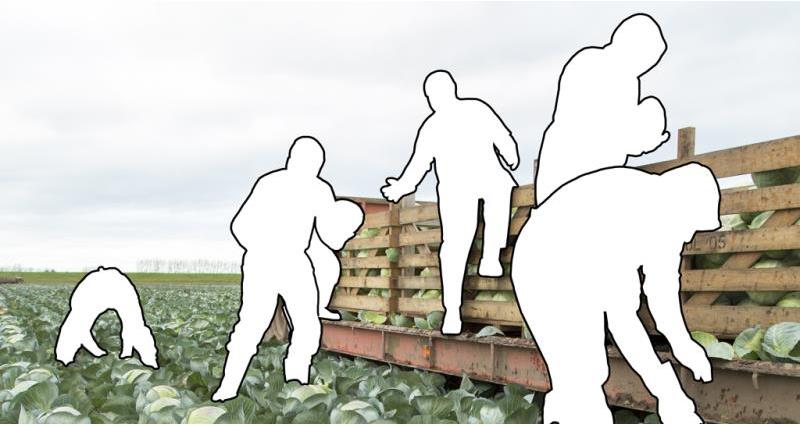With Britons seemingly unwilling to labour in our fields, there’s a stark question – who exactly will pick our crops and process our food in the future? Jonathan Riley investigates for Countryside magazine.
Read what our farmers have to say:
- Guy Poskitt - arable farmer
- Ali Capper - fruit grower
- James Hook - poultry producer
- George Gordon - dairy
Former dairy worker from Romania, Zoltan Peter, told Countryside magazine that workers were turning their backs on the UK because of the weaker pound and uncertainty over the future.
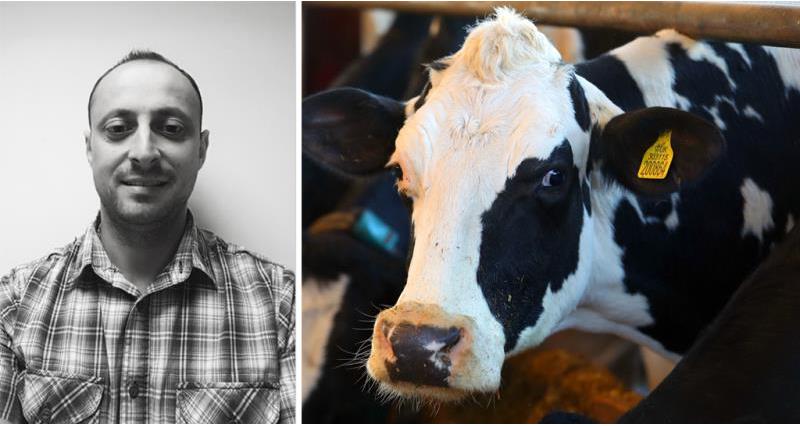
Zoltan, pictured above, now works full-time for Wiltshire-based LKL Recruitment Services. Before the Brexit vote in June 2016 more than 4,000 people a month viewed the agency’s online adverts. But that has been cut in half to just 2,000 views a month, he says.
“Many people in eastern Europe don’t understand why British people voted to leave and believe the UK no longer wants them to come,” says Zoltan. Rumours are adding to the sentiment. “It’s common on Facebook in Romania to see people posting that Britain is already operating tougher border checks.”
But the weaker pound has had the biggest effect.
“Where people could get six Polish zloty to the pound before the Brexit vote, it’s now under five zloty to the pound,” says Zoltan. “In reality, it means pay in the UK has fallen.”
“The euro is just as good and people are going to work for the German car companies instead.”
The repercussions of the shortfall are already starting to be felt and farmers and growers across all sectors are concerned that Brexit will see UK food prices rise, imports increase, and traditional British fruit and veg crops consigned to history.
There’s also a belief that without the labour force, a golden opportunity for the UK to achieve its potential as a food-producing powerhouse will be squandered.
NFU President Meurig Raymond says it’s crucial for the government to ensure farming has access to a competent and reliable workforce, now and post-Brexit. “A solution including visa or permit schemes, is urgently needed or we may lose a
critical number of workers that could jeopardise future harvests and food production,” he says.
What farming needs:
- The supply of seasonal workers for 2018 and 2019 seasons is now in jeopardy, says the NFU. It takes time to recruit large numbers of people, and overseas workers need to feel confident that they will be allowed to come and work in the UK in future. The government must therefore, as a priority, establish a system to enable sufficient recruitment of seasonal labour before Brexit.
- The NFU says that the government must also provide clarity, as a matter of priority, on the status of EU nationals living and working in the UK, given the many permanent workers in the agri-food sector who are EU nationals.
- The forthcoming Immigration Bill must recognise the crucial importance of migration for certain sectors of the UK economy, both low and high skilled, and be based on a realistic expectation of the ability and availability of UK workers to fill the jobs currently carried out by EU migrant workers.
:: Find out more about the NFU's work on Brexit issues such as labour and trade here.
CASE STUDY
Arable grower
> Guy Poskitt
» Kellington, East Yorkshire
Ultimately, Yorkshire arable farmer Guy Poskitt (below) believes Brexit means consumers will end up paying more for veg and it may also force consumers to change their buying habits.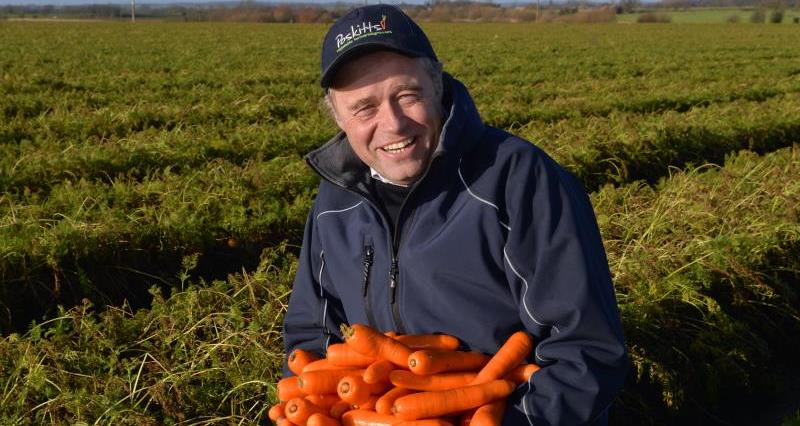
For Guy, who grows 5,755 acres of arable crops including 1,000 acres of field vegetables, the potential ramifications of Brexit and labour supply run deep.
Three-quarters of the 300-strong staff used to process 200 tonnes of vegetables every day on his farm in Kellington, East Yorkshire, are non-UK workers.
“We have non-UK workers all the way through from packers to managers earning up to £30,000 a year,” he says.
But a trend has already emerged since the Brexit vote in June 2016. The weaker pound and uncertainty over future immigration policy has seen workers leaving in higher numbers. It means staff turnover has almost doubled to 60-70 per year.
“Poorer staff retention means we are losing skilled people and our training costs for recruits are increasing,” he says.
It has left Guy with questions for the future – does he entice foreign workers to stay longer by paying more or change the business to farm less labour-intensive crops such as cereals.
Either way, through lower supply or higher production costs veg prices will rise, he predicts. He explains that a 10% increase in hourly rates from £7.50 to £8.25 would add an extra £600,000 a year for the business, which has an annual wage bill of £6m.
Set against the business revenue of £30m a year, an extra cost of £600,000 would require a 5% price rise for its produce to maintain the slim margins available in the veg growing sector.
It means long-term prices will rise both for home-grown and imported produce, which will cost more because of the weaker pound.
Guy believes that while the year-round supply of all types of veg is part of the UK’s modern consumer psyche, the increased cost may see some questioning whether they can justify their choices.
“I don’t see that we will go back to strawberries only being available in the early summer. But those out-of-season strawberries, whether home-grown or imported, will cost more and may become too expensive for some families to bear,” he says.
CASE STUDY
Fruit grower
> Alison Capper
» Stocks Farm, Worcestershire
Apple and hop grower Alison Capper (below) says Brexit should be a big opportunity to double or even triple production for home and export markets, utilising our fantastic produce.
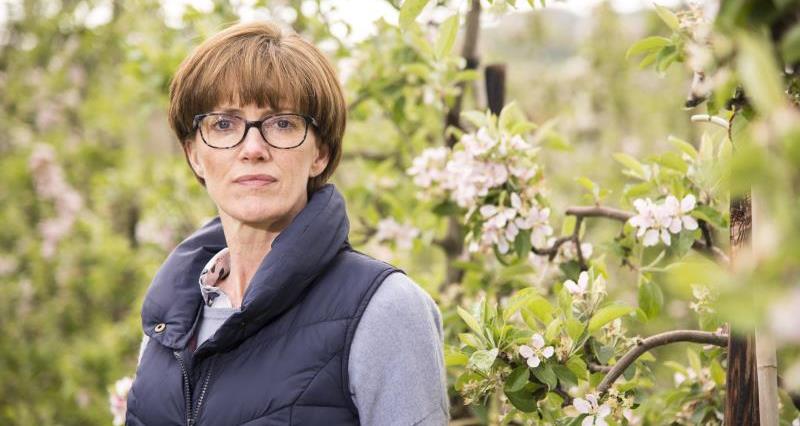
But, if Brexit ends free movement of the European workers needed to pick the crops, the stark decision she faces may be to pull up her trees and quit apple production altogether. Alison grows 100 acres of Gala, Braeburn and Red Windsor apples for the supermarkets and cider making. She also grows 100 acres of hops – enough to brew 46 million pints of beer.
For most of the year the farm operates with three workers. In the spring and summer that grows to 10 workers but at harvest time, between September and November, the number required swells to 70.
“Every year, the farm advertises the jobs locally, but we rarely get anyone coming forward at all,” says Alison. She puts this down to the lowest unemployment rate [4.6% July 2017] for more than 40 years and the fact that UK culture means people want permanent jobs in one location, rather than seasonal work.
At Stocks Farm the labour force is brought in from Poland, Romania and Bulgaria. Even with the weaker pound, pay levels at the national living wage, plus a quality and quantity bonus, are attractive. Quality is crucial, both in terms of appeal to the shopper and to ensure fruit will survive storage. Any bruising means the fruit is prone to rot and will not store – a necessity when marketing crops over a period of many months, Alison explains.
“On our farm, workers pick at 15 apples a minute and they grade and check crops for damage achieving 96%, class 1, grade-out. So without the access to this skilled labour we won’t be able to operate competitively. Unless the government puts in place a system that allows free movement, we may even be forced to consider pulling out the trees.”
That would be wrong for the economy and morally reprehensible, she believes.
“We grow produce in a country that’s just one of nine in the world that has a sustainable rainfall level to support its agricultural industry.”
She urges the government to quickly grasp the environmental benefit and huge potential of British farming. “The government must wake up and move quickly and decisively to ensure that workers can continue to come here and help drive our industry. If that happens we could be a major success story in the Brexit process, doubling or tripling production, supplying the home market with environmentally-sound food and boosting the economy with our exports.”
CASE STUDY
Poultry Producer
> James Hook
» Managing director, PD Hook Group
Sites throughout the UK
Poultry producer James Hook (below) says the squeeze on foreign labour has already begun to bite with processing capacity down and closures of some smaller units under way.
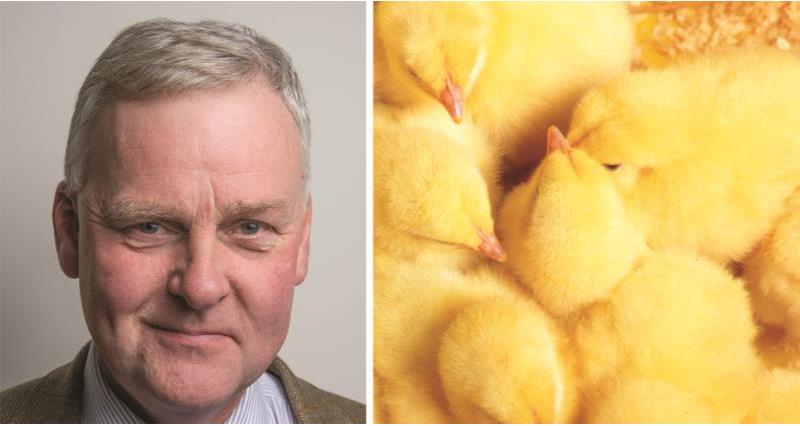
James’ business, PD H Group Ltd, produces seven million chickens and 10 million day-old chicks a year, as well as turkeys for the Christmas market. About 20% of his 2,000 workers are from eastern Europe.
“My big concern is that further up the chain the slowdown will have even bigger repercussions,” says James.
He estimates as many as 80% of the workers in the processing sector are from outside the UK.
“There’s already a shortage in processing and we have had to reduce throughput by 200,000 to 300,000 birds because there are not enough people to handle them,” James explains.
“If the factories can’t operate, then we can’t operate. It’s as simple as that. We have already started to close smaller businesses to reduce our dependency on labour.”
The business is already placing chicks and talking to rearers about contracts for 2019 and 2020, but confusion in political circles, about what will happen and when, is making planning difficult.
“Politicians are making conflicting statements, with one saying free access will continue only for another to announce freedom of movement will be banned from March 2019,” adds James.
“Put simply, they’re talking about banning my workforce, or at least making it more difficult for them to come here. It’s a worrying situation. Even if we can keep going, prices will have to rise to cover increased labour costs, making our product less competitive and vulnerable to imports.
“Our industry also employs and supports tens of thousands of UK workers’ jobs. Yet we are being left, teetering on a cliff edge.
“The government must understand that we must maintain a customs union, freedom of movement and access to the single market – or those UK jobs will also be gone.”
CASE STUDY
Dairy
> George Gordon
» LKL Recruitment Services, Salisbury, Wilts
The UK may be forced to import more dairy products in the future as Brexit threatens to make an already growing labour shortage even worse, according to farmer and recruitment specialist George Gordon (below).
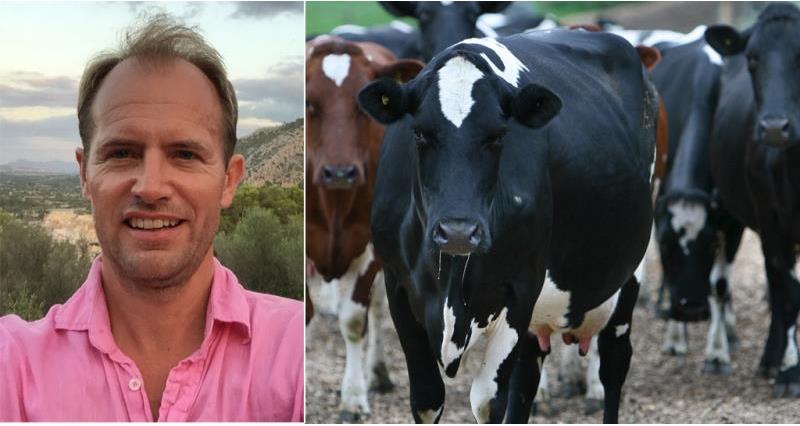
George who is managing director of LKL Services, says Britain ranks alongside New Zealand in terms of its potential to grow grass and produce milk economically.
“The UK can grow grass over a long growing season in a maritime climate, giving it a huge advantage over other milk-producing countries. It also has a large population who consume milk products and is not self-sufficient in dairy commodities.
“And yet, unless we introduce measures to encourage workers to come to the UK post-Brexit, there’s a very real prospect a labour shortage could see us unable to sustain current production,” he says.
Over the past 20 years the dairy industry has contracted from 25,000 to 9,000 farms. But, so far, consolidation into larger units means milk production levels have been maintained at between 12bn-13bn litres a year. However, that consolidation has changed the structure of the labour force, with the larger units having bigger teams of workers operating below manager level.
“This is a big concern because the sector is increasingly dependent on non-UK labour to supply this type of worker,” George says.
Roughly a third of the paid workers on British dairy units are from eastern Europe and the drop-off in labour supply is a huge concern, as without them we cannot maintain production, he says.
“If we cannot find a way of getting workers in from abroad there is a threat that, in the future, we will have the sad situation that our dairy-producing nation is reduced to looking for greater imports to fulfil our demand.”
YOUR VIEW
What’s the solution to this impending labour crisis? Email your thoughts to: bWFydGluLnN0YW5ob3BlQG5mdS5vcmcudWs=
